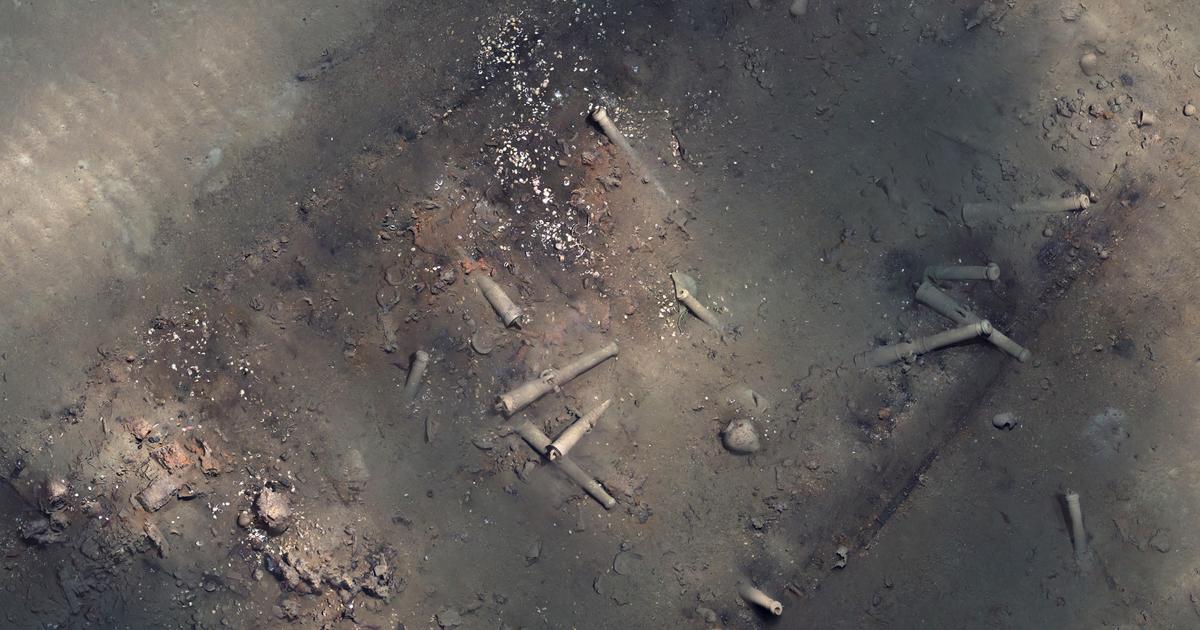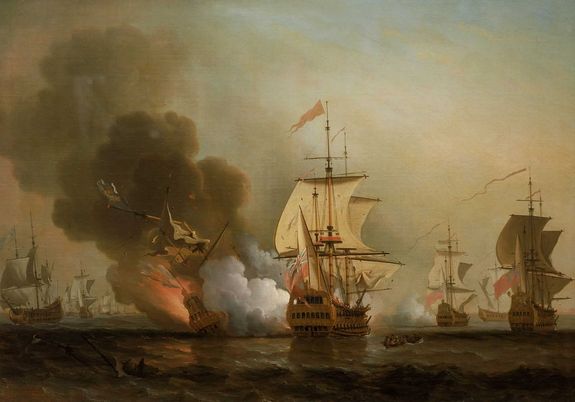CBS News
Plan to recover “holy grail” of shipwrecks holding billions of dollars in treasure is approved over 3 centuries after ship sank

More than three centuries after the legendary San Jose galleon sank off the coast of Colombia while laden with gold, silver and emeralds, the nation has officially approved a plan to recover the wreck and its treasures, officials announced this week.
Dubbed the “holy grail” of shipwrecks, the 316-year-old wreck has been controversial since it was discovered in 2015, because it is both an archaeological and economic treasure — estimated to be worth billions of dollars.
“For the first time in history, a model of comprehensive public management of the archaeological site and asset of cultural interest, protected by regulations and public missionality, is advanced,” the Colombian government said in a news release Tuesday.
Colombian will invest more than $1 million in the recovery process, which is expected to get underway next month, officials said.
Last month, Culture Minister Juan David Correa told Agence France-Presse that an underwater robot would be sent to recover some of its bounty.
Samuel Scott
Between April and May, the robot would extract some items from “the surface of the galleon” to see “how they materialize when they come out (of the water) and to understand what we can do” to recover the rest of the treasures, said Correa.
The robot will work at a depth of 600 meters to remove items such as ceramics, pieces of wood and shells “without modifying or damaging the wreck,” Correa told AFP aboard a large naval ship.
The location of the expedition is being kept secret to protect what is considered one of the greatest archaeological finds in history from malicious treasure hunters.
The San Jose galleon was owned by the Spanish crown when it was sunk by the British navy near Cartagena in 1708. Only a handful of its 600-strong crew survived.
The ship had been heading back from the New World to the court of King Philip V of Spain, laden with treasures such as chests of emeralds and some 200 tons of gold coins.
Before Colombia announced the discovery in 2015, it was long sought after by treasure hunters.
The expedition to start recovering the shipwreck’s trove comes as a case is underway at the UN’s Permanent Court of Arbitration between Colombia and the U.S.-based salvage company Sea Search Armada — which claims it found the wreck first over 40 years ago.
In June 2022, Colombia said that a remotely operated vehicle reached 900 meters below the surface of the ocean, showing new images of the wreckage.
The video showed the best-yet view of the treasure that was aboard the San Jose — including gold ingots and coins, cannons made in Seville in 1655 and an intact Chinese dinner service.
At the time, Reuters reported the remotely operated vehicle also discovered two other shipwrecks in the area, including a schooner thought to be from about two centuries ago.
CBS News
Here Comes the Sun: Jack Antonoff and more

Watch CBS News
Be the first to know
Get browser notifications for breaking news, live events, and exclusive reporting.
CBS News
Capturing Moriah Wilson’s Killer – CBS News

Watch CBS News
Be the first to know
Get browser notifications for breaking news, live events, and exclusive reporting.
CBS News
How to watch the Minnesota Vikings vs. Chicago Bears NFL game today: Livestream options, more

Getty Images
The Minnesota Vikings will take on the Chicago Bears today. The Vikings are currently 8-2, an impressive run so far this season, and will be looking to add a fourth win to their current streak after last Sunday’s 23-13 win against the Tennessee Titans. The Bears, on the other hand, are entering this game on the heels of a four-game losing streak after a tough 20-19 loss against the Green Bay Packers last Sunday.
Here’s how and when you can watch the Vikings vs. Bears game today, whether or not you have cable.
How and when to watch the Minnesota Vikings vs. Chicago Bears
The Vikings vs. Bears game will be played on Sunday, November 24, 2024 at 1:00 p.m. ET (11:00 a.m. PT). The game will air on Fox and stream on Fubo and the platforms featured below.
How and when to watch the Minnesota Vikings vs. Chicago Bears game without cable
You can watch this week’s NFL game on Fox via several streaming services. All you need is an internet connection and one of the top options outlined below.
Fubo offers you an easy, user-friendly way to watch NFL games on CBS, Fox, NBC, ABC, ESPN, and NFL Network, plus NCAA football channels. The Pro tier includes 200+ channels and unlimited DVR, while the Elite with Sports Plus tier adds NFL RedZone and 4K resolution. New subscribers get a seven-day free trial and all plans allow streaming on up to 10 screens simultaneously.
You can watch today’s game with a subscription to Sling’s Orange + Blue tier, which includes ESPN, ABC, NBC, and Fox. The plan offers 46 channels with local NFL games, nationally broadcast games and 50 hours of DVR storage. For complete NFL coverage, add Paramount+ to get CBS games, or upgrade with the Sports Extra add-on for additional sports channels like Golf Channel, NBA TV and NFL RedZone.
Watching NFL games, including Fox broadcasts, is simple with Hulu + Live TV, which includes 90 channels, unlimited DVR storage, and access to NFL preseason games, live regular season games and studio shows. The service includes ESPN+ and Disney+ in the subscription.
Want to watch today’s game live on your smartphone? If so, NFL+ streaming service is the solution you’re looking for. It lets you watch NFL Network and out-of-market games on mobile devices, with an upgrade option to NFL+ Premium that includes NFL RedZone for watching up to eight games simultaneously. Note that NFL+ only works on phones and tablets, not TVs.









